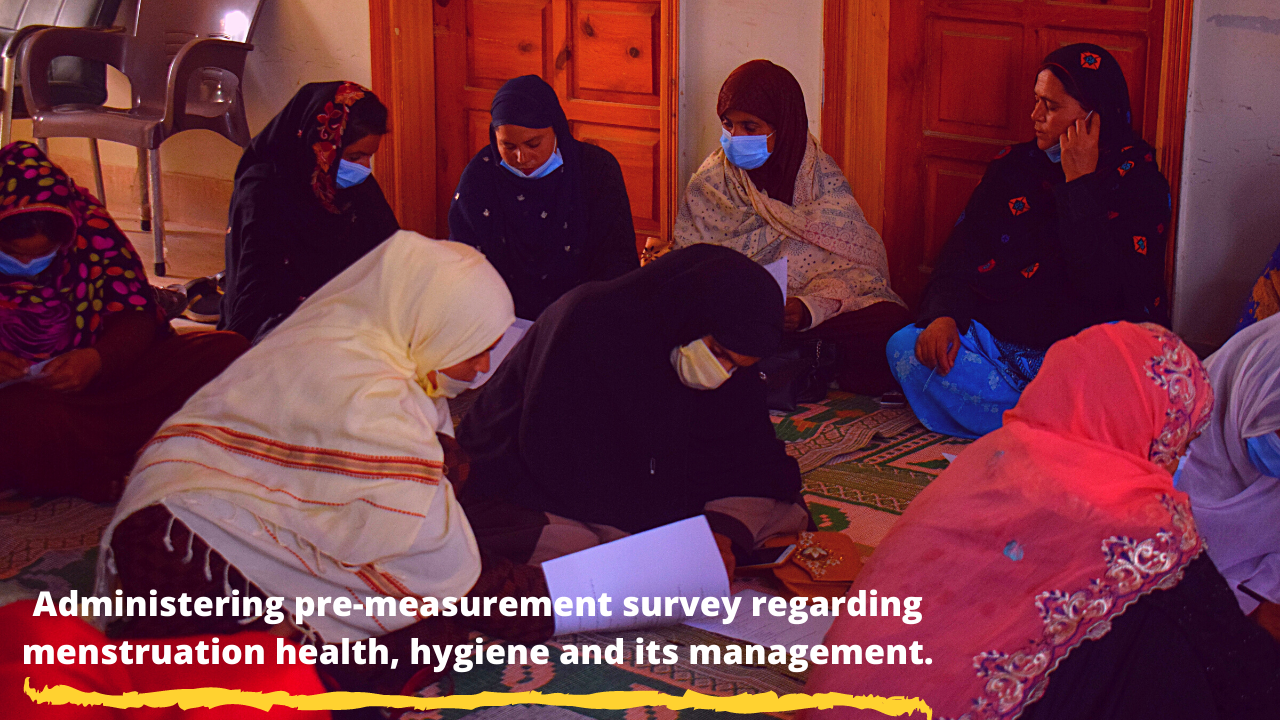Training rural community leaders at SRSO to start menstrual health initiatives
In February 2021, with the support of the EU-funded SUCCESS Programme and its field partner Sindh Rural Support Organization (SRSO), we moved to its district office of Larkana to meet rural leaders of their communities. Larkana lies just west of the Indus river; it derives its name from the neighboring Larak tribe. Larkana is famous for archaeological sites such as Moen-Jo-Daro that has sat beneath the soil for thousands of years, a preserved relic of the ancient Indus Valley civilization. This site is a huge attraction for tourists from all over the world. However, we were attracted by the strong rural women who are not only brave, but also enthusiastic to work for the development of their villages.
The SRSO team at Larkana warmly welcomed and facilitated us conducting technology-driven activities with the Community Resource Persons (CRPs)/ community leaders. CRPs are in charge of conducting awareness sessions in their areas related to issues like mother and child healthcare, health and hygiene, nutrition, birth spacing and much more. But this was the very first time when these CRPs were participating in focus group discussions on menstrual health and its importance.
CRPs from various Larkana villages attended the session. All the CRPs gave a brief introduction of themselves and their villages. After mentioning ethical disclaimers related to consent, we started the conversation with a story of a young girl who had her first periods at school. The CRPs were asked to share their insights about their first menstrual cycle. Myths and taboos shared included not taking a shower during these days and girls not permitted to touch pickles during their periods. Various names associated with menstruation were also found during the discussion including the word ‘Sunnat’ that we had never come across before.
We could not have pulled this off without the technical support of the Larkana staff especially as we needed to introduce Raaji through the projector. Through her animated storyline, the shame and taboos were dispelled. We asked CRPs about what products they are using to manage menstruation and then discussed the hygiene considerations that should be practiced when using ‘Kapra'. An idea for making low-cost sanitary napkins was also made part of the discussion.
Communications Officer from SUCCESS-SRSO helped us administer a pre-measurement survey to collect the data from CRPs regarding menstruation health, hygiene and its management. We were so pleased to see that CRPs were actively participating and asking questions related to menstrual health and management.
CRPs expressed an interest in providing menstrual education in their communities so that girls experiencing their menarche may not feel stressed and embarrassed. Finally, we had an experiment for CRPs in which they were asked to operate Raaji's Chatbot to make them a little familiar with the technology and use it in their future menstrual interventions.
Key Takeaways:
CRPs (Community Resource Persons) were keen to learn more about menstrual hygiene, and we noticed that the majority of them had their phones with them. They also exchanged their phone numbers so that they could continue to get menstrual information.
Women were not afraid of expressing their opinions. The CRPs were well-informed and fluent in Sindhi and Urdu as well. As a result, the language barrier was lesser, and the conversation became more fruitful.
Participants revealed some of the prevalent stereotypes in their communities, and they understood that their role in bringing change could help to eliminate stigmas associated with menstruation.
We have learned that CRPs are not only literate but also have awareness of technology. If they are selected as menstrual champions, they can educate their entire villages on MHM.
Reporting contributions by Ms. Anjum Malik, SUCCESS Communications Officer RSPN and Documentation & Reporting Officer SRSO Ms. Shaiwana Pathan.
.png)

